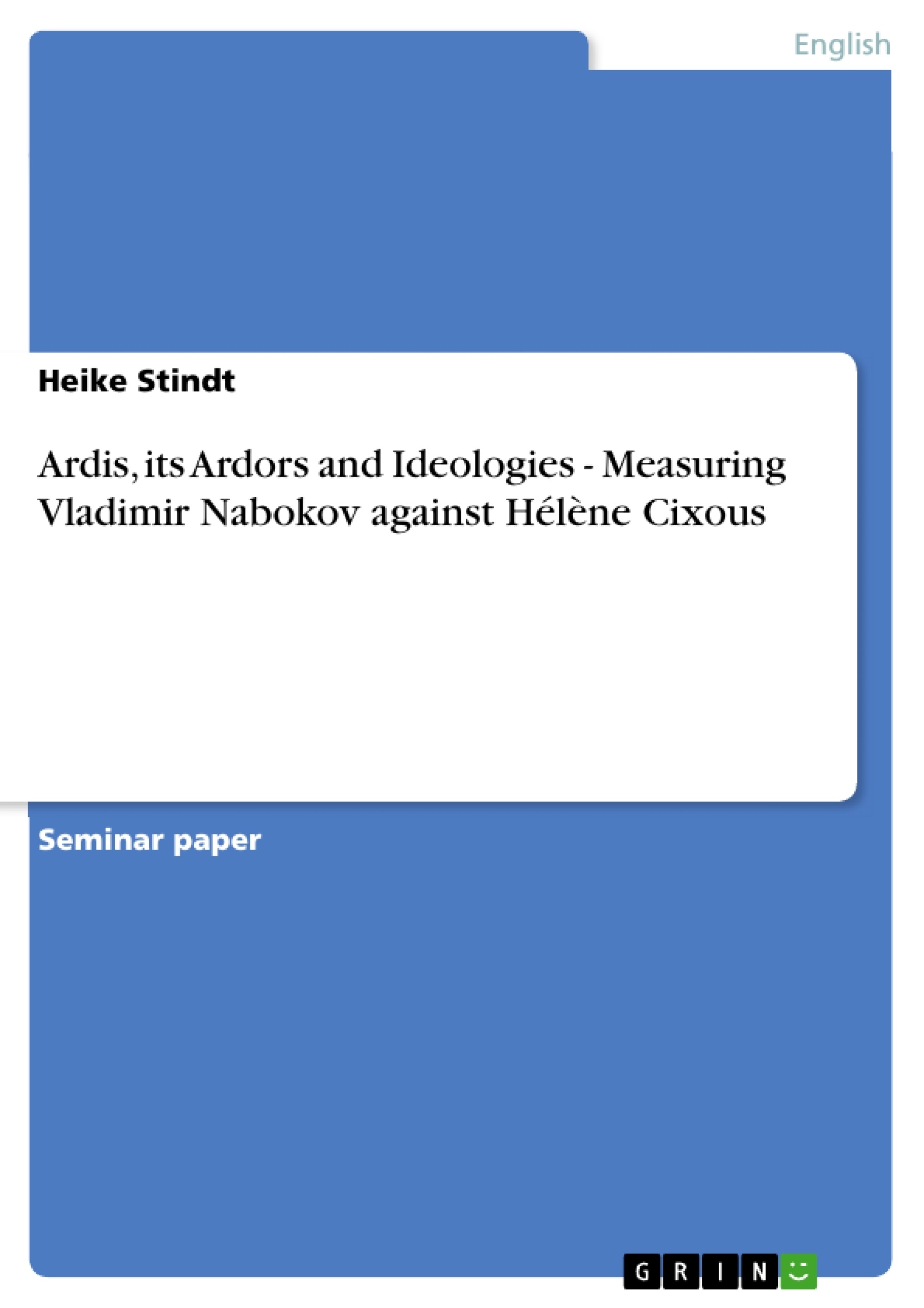Up to this day, scientific research has examined Vladimir Nabokov’s penultimate novelAda or Ardor: A Familiy Chroniclefrom a multitude of theoretical perspectives. But although it displays highly problematic relationships between the different sexes (and also between members of the same sex) and albeit the “male” narrative point of view demands a great amount of caution from the reader, purely feminist approaches are virtually non-existent. This might partly be attributed to the facts that firstly the splendour ofAda’sstylistic expression tends to distract the reader from its possibly “contentious contents” and that secondlyAdais generally regarded as a perfect example of a postmodern novel and therefore considered to be immune to any allegation of adherence to fixed categories.
Inhaltsverzeichnis (Table of Contents)
- I. Introduction
- II. Parody
- A. Playing on genre
- B. Playing with motifs
- 1. The body
- 2. Incest
- III. Mise en abyme
- A. Language and art
- B. Philosophy and fiction
- IV. Point of view
- A. Van's story
- B. On closer inspection
- 1. Who speaks?
- 2. What does “really” happen?
- V. Conclusion
Zielsetzung und Themenschwerpunkte (Objectives and Key Themes)
This paper aims to analyze Vladimir Nabokov's novel Ada or Ardor: A Familiy Chronicle through a feminist lens, specifically examining whether the traditional patriarchal dichotomies outlined by Hélène Cixous's theory of écriture féminine are maintained or deconstructed within the text. The study explores how the novel's unique narrative style and themes challenge conventional literary conventions.
- Parody and Deconstruction of Literary Genres
- The Role of Incest and Family Dynamics
- The Construction of Gender and Sexuality in Narrative
- The Use of Language and Metafiction
- Cixous's Theory of écriture féminine and Its Application to Literature
Zusammenfassung der Kapitel (Chapter Summaries)
The introduction establishes the context for the analysis by highlighting the lack of purely feminist interpretations of Ada or Ardor despite its focus on problematic relationships. It introduces the concept of écriture féminine and the binary system that Cixous posits as organizing cultural discourse. The chapter ultimately argues for a closer examination of the novel to determine its engagement with these established categories.
Chapter II, "Parody," delves into Nabokov's strategic use of genre as a means of deconstruction and subversion. The analysis focuses on how the novel plays with the conventions of the family chronicle, the fictional autobiography, and the Renaissance sonnet cycle. It examines how the incest motif subverts the traditional patriarchal authority of the father and how the setting on Antiterra parodies the conventions of the science fiction genre.
Chapter III, "Mise en abyme," explores the novel's complex relationship with language and art. It analyzes how the text mirrors and distorts itself through various literary devices, including stylistic allusions, quotations, and the creation of a fictional universe. This chapter also examines the novel's engagement with philosophical themes and its blurring of the lines between reality and fiction.
Chapter IV, "Point of view," focuses on the significance of the narrative voice and its role in shaping the reader's understanding of the story. It examines the ambiguities of Van's narration, raising questions about the reliability of his perspective and the true nature of the events he recounts.
Schlüsselwörter (Keywords)
This analysis focuses on key concepts such as parody, genre, écriture féminine, patriarchal dichotomies, narrative voice, incest, family dynamics, metafiction, and the interplay between language and art in Vladimir Nabokov's Ada or Ardor: A Familiy Chronicle. The study explores the novel's engagement with these themes in the context of Hélène Cixous's feminist theory of writing.
- Quote paper
- Heike Stindt (Author), 2005, Ardis, its Ardors and Ideologies - Measuring Vladimir Nabokov against Hélène Cixous, Munich, GRIN Verlag, https://www.grin.com/document/59652



